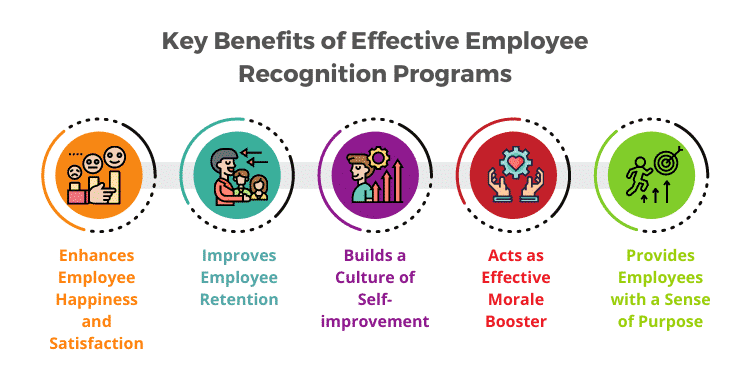1. Boosts Employee Satisfaction and Retention: Effective recognition programs enhance employee happiness, job satisfaction, and retention by making employees feel valued and appreciated, reducing turnover, and attracting top talent.
2. Fosters a Culture of Self-Improvement: Recognition programs encourage continuous learning and improvement, motivating employees to develop new skills and competencies and enhancing overall productivity.
3. Enhances Morale and Purpose: Employee recognition is a powerful morale booster, instilling a sense of purpose and clarity about employees’ roles, aligning individual efforts with business goals, and promoting collaboration.
4. Supports Business Growth: Recognition programs significantly impact business growth and productivity by cultivating a positive work environment, driving engagement, and ensuring continuous employee development.
Various studies have shown that employee appreciation enhances productivity and efficiency. So, many organizations have created well-thought-through and effective employee recognition programs as an integral part of their HR practices.

Recognizing their employees’ efforts and contributions helps organizations develop a self-motivated and dedicated workforce.
When good work and desirable behaviors of employees are recognized, they get a sense of being valued by their employers.
Hence, it boosts their happiness and satisfaction and inspires them to continue giving their best performance.

A properly implemented employee rewards and recognition program can contribute to employee engagement, morale, turnover, productivity, and purpose.
Recognized employees tend to be highly connected and committed to the organization.
Therefore, they will go above and beyond their assigned roles and responsibilities.
Knowing the key benefits of such programs is essential for understanding the importance of rewarding and recognizing employees.
The most important of these benefits are as follows:
1. Enhances Employee Happiness and Satisfaction
2. Improves Employee Retention
3. Build a Culture of Self-improvement
4. Acts as an Effective Morale Booster
5. Provides Employees with a Sense of Purpose


When employees receive appreciation for their work, they feel a sense of pride and happiness.
It assures them that they are fulfilling their responsibilities well.
This improves their overall job satisfaction besides enhancing their sense of belonging and commitment to the organization.
Hence, recognition programs can help enhance employee motivation and make them happier and more satisfied.

Long-term retention of employees is something that most businesses today are struggling with.
Implementing a good recognition program can prove highly beneficial in this context.
When employees feel valued and appreciated for their contribution, they are less likely to seek employment options outside.
Moreover, a higher employee retention rate helps to enhance the employer’s brand value.
It can, in turn, make it easier for the organization to attract top talent in the future.

Organizations implementing an effective recognition program can create a culture of self-improvement in a relatively effortless manner.
Rewarding and recognizing even one employee can inspire and motivate the workforce.
This helps to improve overall employee productivity and build a work culture centered around good performance.
Hence, they are more willing to learn new skills and build competencies to keep pace with the changing business needs.

The organizational culture is the glue that keeps the organization together and ensures its smooth functioning.
Hence, it is essential to boost employee morale and build an organizational culture that inspires greater productivity and innovation.
Appropriate rewards and recognition can help employees feel valued by the organization and enhance their trust and confidence in their employer.
They would willingly take up more tasks and responsibilities, even if they are challenging ordinarily.
It, in turn, can help in enhancing business growth.

Rewarding employees can give them a sense of purpose and help them understand how their work aids the business.
Hence, this understanding of shared business objectives makes employees more supportive of each other and collaborative.
They learn to respect and implement corporate values in their everyday work until it becomes a habit.
Additionally, it helps eliminate any doubts employees might have about their roles and responsibilities within the organization.
Building a work culture based on an effective employee recognition program can deeply impact the various levers of business growth and productivity.
It contributes towards cultivating a positive work environment, continuous employee development, employee engagement, and stronger retention.
These factors are essential in defining an organization’s growth trajectory and helping it forge ahead of its competitors.

Lead author: Sagar Chaudhuri, the Co-Founder and CEO of HiFives. He is an HR Tech Evangelist with over 25 years of corporate and entrepreneurship experience. In the past, Sagar has worked in leadership roles with companies such as Genpact, Infosys, and ICICI Bank. He has an engineering degree from IIT Kharagpur and an MBA from IIM Lucknow. Connect on LinkedIn
To stay updated on the latest HiFives blogs, follow us on Twitter (@MyHiFives)